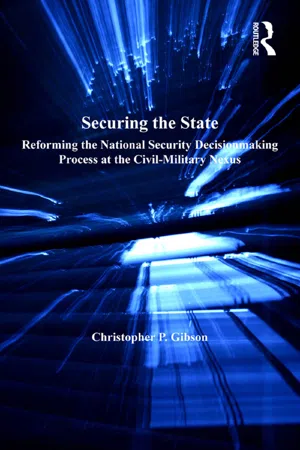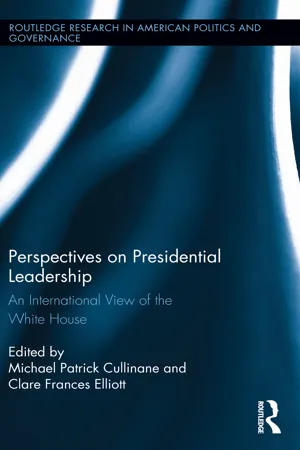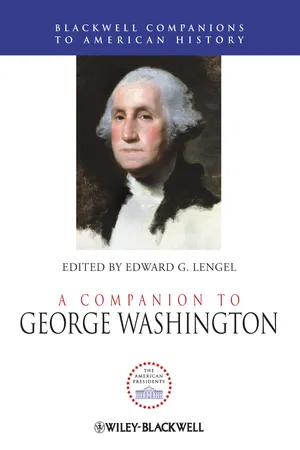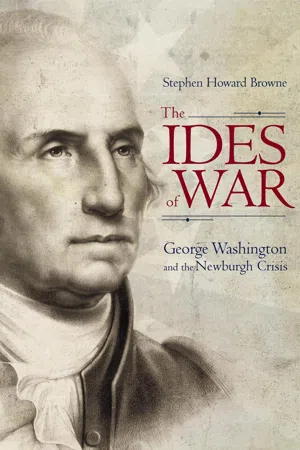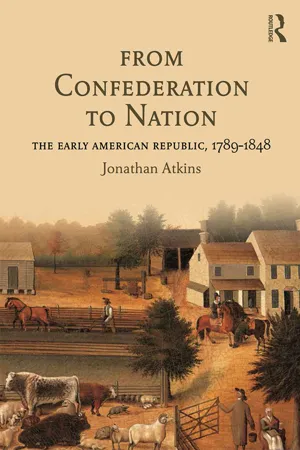History
General George Washington
General George Washington was a pivotal figure in the American Revolutionary War and the first President of the United States. He is renowned for his leadership, strategic acumen, and unwavering commitment to the cause of American independence. Washington's legacy as a founding father and his contributions to shaping the early republic have solidified his place in history as an iconic figure.
Written by Perlego with AI-assistance
Related key terms
7 Key excerpts on "General George Washington"
- eBook - ePub
Inventing the Job of President
Leadership Style from George Washington to Andrew Jackson
- Fred Greenstein(Author)
- 2009(Publication Date)
- Princeton University Press(Publisher)
CHAPTER 2
The Foundational Presidencyof George Washington
If indeed he does that, he will be the greatest man in the world.—Remark attributed to George III upon being informed that Washington intended to resign his command and return to Mount Vernon after the RevolutionVery few who are not pwhilosophical Spectators can realize the difficult and delicate part which a man in my situation had to act. . . . I walk on untrodden ground. . . . There is scarcely any part of my conduct which may not hereafter be drawn into precedent.—George Washington to Catherine Macaulay Graham, January 9, 1790I consider the successful Administration of the general Government as an object of almost infinite consequence to the present and future happiness of the Citizens of the United States.—George Washington to Thomas Jefferson, January 21, 1790The powers accorded the presidency by the Constitution “would not have been so great,” one of its framers recalled, if he and his colleagues had not “cast their eyes toward General Washington as president and shaped their ideas of the powers to be given to a president by their opinions of his virtue.”1 In the aftermath of their experience with the British monarch, it went against the grain for Americans to go along with strong leaders, but they were prepared to make an exception for Washington. Two decades before a nation existed in which it was possible for him to be first in war and peace, Washington was already acclaimed throughout the British colonies for his exploits in the French and Indian War. Such was his esteem that he was unanimously elected to high positions four times—as commander in chief of the Continental Army in 1775, as president of the convention that framed the Constitution in 1787, and to his two terms as the nation’s first president in 1789 and 1792.Figure 2.1. George Washington’s well-publicized forays into the frontier and his military feats made him an admired presence in Great Britain’s North American colonies long before the United States came into being. Portraits showing what one of Washington’s associates referred to as his “commanding countenance” were widely displayed in the early republic. As president, Washington established precedents for strong executive leadership and legitimized the new political system by lending it his towering prestige. - eBook - ePub
Securing the State
Reforming the National Security Decisionmaking Process at the Civil-Military Nexus
- Christopher P. Gibson(Author)
- 2016(Publication Date)
- Routledge(Publisher)
1412 See, for example, Joseph Ellis’ description of the failure of the Monongahela Campaign in, His Excellency: George Washington, pp. 19–24.13 It is worth noting that in some respects, George Washington accepted a demotion of sorts by taking the position of Commanding General. In an instance he went from a peer (fellow Member of Congress) to a military man subservient to his civilian masters, those with power vested in them by the people of the various Colonies.14 For another excellent recent account on General Washington see David R. Palmer, George Washington and Benedict Arnold (Washington, DC: Regnery Publishing, Inc., 2006).Unlike today’s civil–military arrangements, General Washington did not have the benefit of a Secretary of Defense to work with for most of the Revolution as he pursued military objectives for the Continental Congress and the American people. The position of Secretary at War was not even established until 1781 (it was changed to Secretary of War in 1789, after the ratification of the Constitution). But this did not cause particular concern among members of the Continental Congress that military voices would dominate them. Such a contention was absurd in a period when no professional officer class existed. To be sure, there were strands of anti-militarism and significant opposition to a standing peacetime army.15 But even as the Founders debated how to reform their government later at the Constitutional Convention and the deliberations that followed leading up to ratification, when it came to national security institutions, with the notable exception of Brutus (Robert Yates Of New York), their chief concerns were more focused on political control of the military: that is, preventing one branch of the government from taking the reins of the Army and turning it on others, the States or the people, than in keeping military men in their place.16 If the country was preoccupied with preventing military men from exercising influence in the new Republic, how was it that the first man elected to the Presidency was the closest thing the country had to a military professional? George Washington, the soldier, statesman, and farmer from Mount Vernon was elected unanimously in the first Electoral College.17 - eBook - ePub
- Michael Patrick Cullinane, Clare Frances Elliott(Authors)
- 2014(Publication Date)
- Routledge(Publisher)
1 The Meanings of Going First George Washington and the PresidencyFinn PollardOn both sides of the Atlantic, in surveys ranking American presidents, three figures perennially top the list: George Washington, Abraham Lincoln, and Franklin D. Roosevelt. The basic grounds for Washington’s prominence (as indeed for the other two) are easily uncovered. The office was created specifically with him in mind. Yet his eligibility to serve was placed in doubt by the hotly contested battle to ratify the Constitution in Virginia, and when he took office, a deep suspicion of such a central executive authority remained. By the time he retired, though the office’s occupancy and powers remained disputed, its existence did not. Washington was the crucial man in establishing the legitimacy of the office, a role that should assure him a top three ranking because, had he failed, he might have had no successors at all.If we move beyond legitimacy, then Washington’s presidency poses much more difficult questions. On the domestic front, historians continue to dispute how much control and indeed understanding Washington had with respect to Alexander Hamilton’s financial policies—the dominating domestic issue of his presidency. On the foreign front, although Washington has usually been judged as making the correct decision on neutrality, it was a hotly contested one that left unresolved problems for his successors. And on the political system itself, Washington could be judged on his own terms as a pretty comprehensive failure. Washington, like many of his contemporaries, abhorred political parties and sought first to smooth them away and then to stand above them. Yet, despite this attitude, parties (of a sort) developed, and, as some historians argue, Washington became, by the end of his second term, as partisan as his fellows. If presidential rankings are based on policy successes, there are grounds to wonder why Washington stands as high as he does. - eBook - ePub
- Edward G. Lengel(Author)
- 2012(Publication Date)
- Wiley-Blackwell(Publisher)
Chapter Twenty-Two
GEORGE WASHINGTON: AMERICA’S FIRST SOLDIER
Thomas A. Rider II1. Washington’s Unique Challenge
On 31 March 1776 General George Washington, Commander-in-Chief of the Continental Army, wrote to his brother John Augustine from his headquarters in Cambridge, Massachusetts. “I believe I may, with great truth affirm,” Washington declared, “that no Man perhaps since the first Institution of Armys ever commanded one under more difficult Circumstances than I have done – to enumerate the particulars would fill a volume” (PGW,Revolution, 3:569). When he penned these lines, Washington was venting the frustrations of his first nine months in command. Beginning in July 1775 when he arrived outside Boston, through the British evacuation of that city in March 1776, Washington had struggled to create “Order, Regularity & Discipline” in a conglomeration of men who formed an army in name only (PGW,Revolution, 1:138). If bringing the Continental Army to life was not challenging enough, Washington had to figure out how to feed, arm, and equip it while simultaneously building the bureaucracy that would make these tasks possible. Moreover, Washington saw to all of these problems, and countless others, while besieging the enemy. In December 1775, just as he began to make headway, the army dissolved before his eyes as the soldiers’ terms of service expired. Washington had to start over with newly recruited formations.The Commander-in-Chief’s frustrations continued beyond his first campaign. Washington’s complaints to his brother in 1776 would have been appropriate at virtually any point during the American Revolution. Throughout the war, Washington faced a level of responsibility unique in American military history. Unlike almost any other American soldier, Washington’s duties required him to perform across what modern soldiers and scholars call the levels of war. At the strategic level Washington interacted with and supported civilian authorities. He allocated resources and disseminated information across the theaters of war. He also developed military strategy to support national war aims to include negotiating coalition strategy after France entered the war. As commander of the Main Army, Washington performed at the operational level of war. He planned campaigns, positioned his army to gain battlefield advantage, and sometimes out-maneuvered the enemy without having to fight. He hampered enemy logistics and supplied his own army. Finally, at the tactical level of war, Washington planned battles and led soldiers on the battlefield – not infrequently within range of British muskets. Washington did all of these things while simultaneously building the Continental Army. - eBook - ePub
The Ides of War
George Washington and the Newburgh Crisis
- Stephen Howard Browne, Thomas W. Benson(Authors)
- 2016(Publication Date)
- University of South Carolina Press(Publisher)
No public figure in American history, it is safe to say, has ever bettered his talent for showing up at just the right time and place. The man knew how to make an entrance: at the start of hostilities in 1754 that would help launch an interminable war for great-power hegemony between England and France; at the beginning of continental gatherings to formalize colonial resistance. Washington was the first of America’s commanders in chief, its first president, the first to deliver an inaugural address, the first and only president to lead a military expedition in office, the first former president to pass from this world. These firsts are the more notable because they were made conspicuous, either because history conspired to make them so or because Washington himself made certain that his arrival onto the scenes of public life was duly recognized. That might mean writing up an account of his early adventures into the Allegheny Valley, or donning his blue and buff uniform at the second Continental Congress, or riding into New York City showered with flower petals. But, whatever its form, his beginnings were designed for optimal symbolic resonance. 5 That Washington could be at once complicit in this stagecraft and largely untouched by its more destructive effects was not a given. As an otherwise appreciative British officer observed in 1780, His Excellency may have been actuated by principles early on, but “Few men have fortitude enough to withstand the dazzling glare of power, the love of which too often intoxicates the human heart, and where it takes possession, seldom fails to stifle the good affections which rise to resist it.” In time, something like this very tendency would animate the partisan battles of the republic’s first decade - eBook - ePub
Revolutionary Prophecies
The Founders and America's Future
- Robert M. S. McDonald, Peter S. Onuf(Authors)
- 2020(Publication Date)
- University of Virginia Press(Publisher)
3George Washington’s Vision for the United States
Kenneth R. BowlingWhen Americans think of George Washington as the father of their country, they think of his practical accomplishments as commander in chief of the Continental Army, as president of the Constitutional Convention, and as president of the United States. But it is perhaps more appropriate to call him that in another sense, for, despite his inability to accept democracy or, apparently, even to write the word, Washington better than any other American revolutionary had the prescience to envision what the United States would become: an economically and religiously diverse, multiracial society that overcame its deep sectional divisions and whose enlightened federal government, seated in a large and magnificent capital, provided its citizens with cultural, scientific, and educational amenities. Washington’s concern for the survival of the union was the driving force behind this forward-looking perspective; behind that was this highly ambitious man’s fear that, if the union failed, along with it would go his historical reputation, something very dear to him.Some of my argument comes from Washington’s private and public letters, but most of it is based on his state papers and those his department heads submitted to Congress in his name, all but one of which survive. The one that does not, his magisterial, seventy-three-folio-page undelivered first inaugural address, is arguably the most important of them all, judging from its remnants. It survived in his papers until at least 1827, after which the historian and documentary editor Jared Sparks, with the implied encouragement of James Madison, who had prevented its delivery in 1789, began to cut it up and mail the ever smaller pieces to people requesting an example of the great man’s handwriting. It belongs with the 1783 Address to the States and the 1796 Farewell Address as the most extensive and detailed statements of Washington’s political views; like them, its viewpoint is centralist and stresses the necessity of supporting and maintaining the union against the forces of dissolution. Although undelivered, as president he used portions in his annual messages.1 - eBook - ePub
From Confederation to Nation
The Early American Republic, 1789-1848
- Jonathan Atkins(Author)
- 2016(Publication Date)
- Routledge(Publisher)
I George Washington’s AmericaGeorge Washington received official notification of his election as the first president of the United States on April 14, 1789. Two days later, he left Mount Vernon, his beloved Virginia plantation on the banks of the Potomac River, and headed for the Union’s capital in New York, accompanied by Charles Thomson, the secretary of Congress; David Humphreys, his former military aide; and William Lee, his personal slave. Triumphant celebrations greeted Washington at several stops on the way, giving his journey the character of a royal procession. But privately, he confessed misgivings about his new responsibility. On the day he left Mount Vernon, he wrote in his journal that he “bade adieu … to private life, and to domestic felicity … with a mind oppressed with more anxious and painful sensations than I have words to express.” He pledged to perform his duties “with the best dispositions to render service to my country in obedience to his will,” but, he admitted, “with less hope of answering its expectations.”Washington’s reservations stemmed partly from his reluctance to leave retirement. He also recognized the portentous challenges he would face in his new office. As commanding general of the Continental army, he had led thirteen British North American colonies in the successful war to gain independence. War and revolution had created a sense of nationalism, an idea that the citizens of the thirteen states made up one people. Nevertheless, Americans understood the Union—as they usually referred to the United States—as a union of states, joined together in a loose confederation that guarded the states’ sovereignty. Different heritages and long-standing tensions among the states made state loyalties stronger than nationalist sentiments, and with the war’s end the states’ willingness to cooperate waned. Washington himself had recently participated in a convention that tried to create a government that would directly serve all of the Union’s people, rather than work for the states like the government it replaced. The states would still play a role in the new government, however, and most Americans remained skeptical about the new constitution’s prospects. Washington’s actions as president would help determine whether the Union would be preserved. For him and others, the Union’s fate would decide the outcome of the Revolution itself.
Learn about this page
Index pages curate the most relevant extracts from our library of academic textbooks. They’ve been created using an in-house natural language model (NLM), each adding context and meaning to key research topics.

